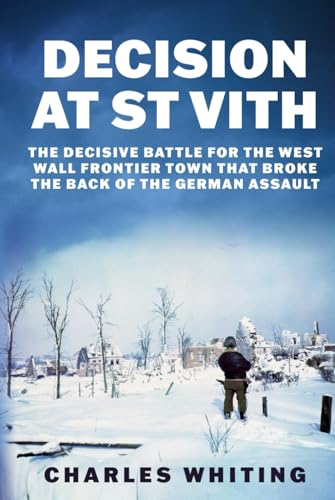
An eye-opening account of one American division’s desperate attempt to hold back the might of the last major German offensive on the Western Front during World War II. Although the 106th Infantry Division was decimated, and the Germans captured over six thousand prisoners in one of the largest mass surrenders in American military history, the efforts of these American soldiers to defend St.-Vith disrupted the German timetable for reaching Antwerp, thus hampering the Bulge offensive. This remarkable but often forgotten story of how an American division sacrificed itself to achieve a greater victory should be essential reading for fans of military history. On December 16, 1944, the young men of the U.S. 106th Infantry huddled in their foxholes and tried to sleep. They had never been in battle before and were told they were unlikely to see fighting soon, as they occupied a “rest sector” on the front. Yet charging toward them was the might of the 18th Volksgrenadier a quarter of a million German soldiers, two thousand artillery pieces, and nearly one thousand tanks. This was the German Wehrmacht’s first shattering blow in the Battle of the Bulge. Yet why was this division so unprepared? What decisions or lack of them had Allied Command made prior to this monumental attack occurring? Charles Whiting, a renowned military historian and veteran of the Second World War, brings to life the horrors experienced by ordinary combat soldiers during this terrifying battle. Through meticulous research, Whiting sheds light on the chaos of battle, explaining how this untested American division attempted to hold back the seasoned veterans of the German army. “One small but important aspect of the Ardennes campaign... successfully conveys the chaos of the fighting.” Kirkus Reviews “This is a fast-moving, exciting, and fair account of the key battle of the Battle of the Bulge.” Military Affairs
Author

Charles Whiting was a British writer and military historian and with some 350 books of fiction and non-fiction to his credit, under his own name and a variety of pseudonyms including Ian Harding, Duncan Harding, K.N. Kostov, John Kerrigan, Klaus Konrad, and Leo Kessler. Born in the Bootham area of York, England, he was a pupil at the prestigious Nunthorpe Grammar School, leaving at the age of 16 to join the British Army by lying about his age. Keen to be in on the wartime action, Whiting was attached to the 52nd Reconnaissance Regiment and by the age of 18 saw duty as a sergeant in France, Holland, Belgium and Germany in the latter stages of World War II. While still a soldier, he observed conflicts between the highest-ranking British and American generals which he would write about extensively in later years. After the war, he stayed on in Germany completing his A-levels via correspondence course and teaching English before being enrolled at Leeds University reading History and German Language. As an undergraduate he was afforded opportunities for study at several European universities and, after gaining his degree, would go on to become an assistant professor of history. Elsewhere, Whiting held a variety of jobs which included working as a translator for a German chemical factory and spells as a publicist, a correspondent for The Times and feature writer for such diverse magazines as International Review of Linguistics, Soldier and Playboy. His first novel was written while still an undergraduate, was published in 1954 and by 1958 had been followed by three wartime thrillers. Between 1960 and 2007 Charles went on to write over 350 titles, including 70 non-fiction titles covering varied topics from the Nazi intelligence service to British Regiments during World War II. One of his publishers, Easingwold-based Rupert Smith of GH Smith & Son said he was a quiet man and prolific writer. "He's one of a band of forgotten authors because he sold millions of copies and still, up to his death was doing publishing deals.He was the kind of man who was very self-effacing, one of Britain's forgotten authors, still working at 80 years of age, with his nose down and kicking out books." Charles Henry Whiting, author and military historian died on July 24 2007, leaving his wife and son.